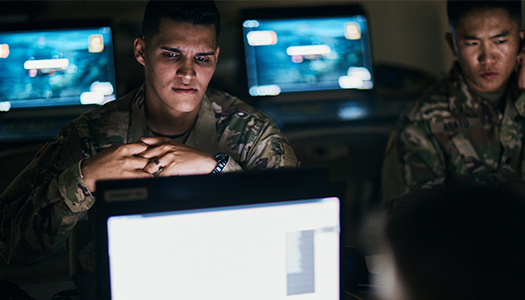- Home
- Career Overview
-
Looking
-
Applying
- College Overview
-
Planning
-
Applying
-
Paying
-
Attending
- Military Overview
-
Joining
-
Serving
These technology careers in the Military are some of the most advanced jobs for its officers and enlisted members today.
Interested in cyber careers? Take the Cyber Challenge
IT managers in the Military are responsible for developing, implementing, and supporting both short- and long-term IT plans. They create and administer IT policies and procedures, and ensure the Military has the software, hardware, and programs needed to complete its missions efficiently and effectively.
Construction managers provide construction, survey and design, and electrical engineering expertise across a broad spectrum of construction operations in a variety of units. They coordinate and plan the development and support of military construction programs and maintain technical liaison with systems commands and fleet commands on facilities logistic problems.
Caseworkers are responsible for overseeing and managing resources, programs, and functions regarding mental health services within the military community. They support services in psychiatry, social work, psychology, family advocacy, substance abuse awareness, and rehabilitation. They assist mental health professionals and advise in planning and administering treatment methods. They perform managerial duties in directing and coordinating resources, as well as developing, implementing, and evaluating training related to mental health programs.
Healthcare administrators manage military hospitals, clinics, and other healthcare facilities. They oversee the medical and administrative functions of healthcare facilities, and they ensure the readiness of both personnel and equipment to meet the medical needs of service members and their families.
Physical scientists carry out research tasks within a chosen field of study. They conduct experiments or make observations, analyze findings, operate necessary equipment, and develop and test theories.
Environmental health and safety specialists protect the military community through programs to ensure that military facilities and food supplies are free of disease, germs, and other hazardous conditions. These specialists identify, research, and mitigate occupational and environmental health hazards and risks that may negatively impact health, human performance, and environmental health quality. They manage programs related to communicable disease control and prevention, food safety and defense, sanitary compliance, occupational health and safety, hazardous material control, and public health contingency response. They also assess Chemical, Biological, Radiological and Nuclear safety.
Military logisticians are responsible for ensuring that equipment and people are where they need to be, exactly when they need to be there. They are also responsible for precise planning and organization, and must consider all possible aspects, phases, and contingencies while working in conjunction with other organizations to make sure every mission is safe, successful, and effective.
All-source intelligence officers ensure the fusion of information of all sources and intelligence disciplines into finished analytical products. They supervise and coordinate the planning, collection, evaluation, analysis, fusion, production, and dissemination of imagery, signals, measurements, human, and open-source intelligence data into cohesive products to support national defense.
Business operations and management analysts apply business expertise to improve military operations. Using a structured approach to problem solving, these analysts make recommendations to leadership about management techniques that can help reduce waste and inefficiency. They gather and analyze data to develop procedures to improve operational efficiency and manpower utilization. They also evaluate programs, personnel, and equipment through the use of exercises and simulations.
Manpower specialists provide support on manpower, which is the composition of the force. They oversee manpower resources and manage manpower requirements. They determine how many and which capabilities are required to execute a mission, and they advise on the allocation of military and civilian resources. They support accession planning, reassignment, retraining, retirement, reenlistment, and force development programs. They operate manpower data systems, prepare relevant reports, and supervise efforts focused on continuous improvement.